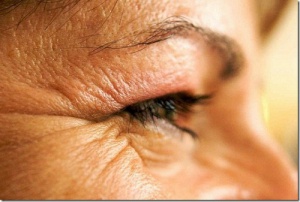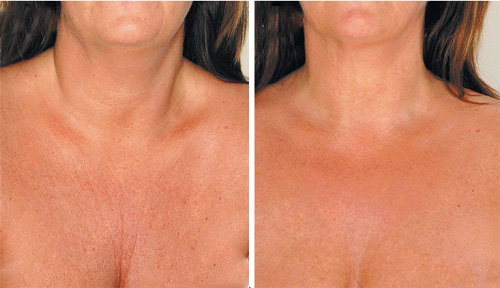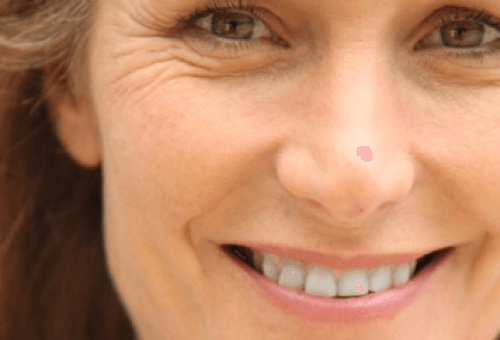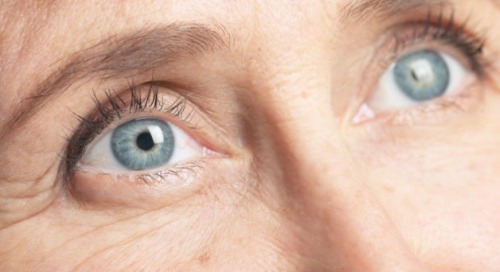Food and Habits that Cause Premature Wrinkles

As we age, our skin loses its natural elasticity, hydrogen and moisture, resulting in the dreaded wrinkles. Although this is a natural process, certain factors can actually cause premature wrinkles.
Learn what these factors are so you can avoid them!
Types of wrinkles
Wrinkles can be classified into three groups according to their origin, appearance, and depth:
- Gravity wrinkles: These are caused by gravity, a force that acts on the skin and causes it to “droop” downward. The level of resistance to this is determined by a person’s genes and the type of skin they have, as well as how well they take care of it. One of the most common places for gravity wrinkles to appear is around the corners of the mouth, pulling down on the lips.

- Dynamic wrinkles: These wrinkles are caused by movement in the facial muscles – those used to smile, talk, smoke, etc. Patterns of movement can cause different wrinkle formation on different people. For example, if you frequently drink out of a straw you’ll have a distinct wrinkle pattern whenever you move your mouth to talk. This becomes even more evident as elasticity and collagen are lost. Lines above the lips, on the forehead, and “crow’s feet” around the eye area are the most well-known types of dynamic wrinkles.
- Wrinkles of mixed origin: These are caused by a combination of the two types mentioned above: gravity and movement. A classic example is in the neck, where skin slackens due to gravity, and wrinkles form by repeated nodding gestures.
Habits that cause premature wrinkles
Aside from the effects of the natural passage of time, some people develop wrinkles at a younger age than others. This can be due to bad habits that cause premature wrinkles, such as:
- Alcoholic beverages: A person who drinks every day or throughout the weekend may, for example, subtract two years off their skin’s normal lifetime.
- Leading a sedentary lifestyle: It has been shown that a lack of weekly exercise can cause premature wrinkles to form.
- Insomnia: Lack of sleep is linked to premature aging of the dermis, because sleep stimulates the production of a hormone that helps promote the renewal of collagen.

- Too much sun: If you spend a lot of time sunbathing outside, sun exposure will cause lines to form in addition to causing the dermis to thicken, creating sun spots, and even increasing the probability of developing skin cancer.
- Smoking: This is a very bad habit for several reasons. Where wrinkles are concerned, nicotine doesn’t allow the skin to “breathe.” Moreover, every “puff” of a cigarette causes more wrinkles around the mouth, especially the upper lip.
- Stress: The skin’s responses to stress are similar to those of insomnia. Being nervous or under pressure is synonymous with aging faces, wrinkles, gray hair, and alopecia.
- Skipping breakfast: This is a common mistake made in today’s society. Many people don’t eat breakfast properly, either because they don’t have time or just aren’t in the habit of eating breakfast at all. But the first meal of the day is the most important, and it’s even better if it’s healthy and balanced.

- Bad attitude: People who harbor resentment and grudges have increased activity in their nervous system, which lowers their quality of sleep. As a result, their appearance is worsened.
- Sweets: A diet that’s high in sugar not only causes weight gain and obesity, but can result in an increased risk of diabetes, wrinkles, and acne.
- Disease: Some particular medical conditions can cause premature wrinkles, either due to side effects of the medications or the disease itself. Sometimes it’s hard to keep everything balanced in the body.
- Sudden weight loss: People who are overweight and slim down rapidly not only show changes in relation to the pounds they lose – they may also look “older.” Subcutaneous fat fills in wrinkles and makes the skin appear smooth. But when weight is lost, this changes completely.
Foods that cause premature wrinkles
The biggest enemy of young and beautiful skin is sugar. But pay attention: it’s not just desserts, chocolates, or sweets at fault. It can be any food that causes “glycation,” or the reaction between carbohydrates, proteins, and fats at high temperatures.
Avoid marinating meats. Don’t eat fried food like fish and chips. Reduce the amount of food cooked over high heat (always use low or medium heat, even though it may take longer to prepare). It’s also best to avoid drinking too much liquid during meals.
Eating more fruits and vegetables instead of sugars can be beneficial, because they can help eliminate free radicals. In addition to being rich in antioxidants, these foods are delicious and not fattening.
By incorporating these foods into your diet and staying away from foods that cause premature wrinkles, you can make your face look and feel many years younger.
All cited sources were thoroughly reviewed by our team to ensure their quality, reliability, currency, and validity. The bibliography of this article was considered reliable and of academic or scientific accuracy.
- Lemperle, Gottfried & Holmes, Ralph & Cohen, Steven & Lemperle, Stefan. (2001). A Classification of Facial Wrinkles. Plastic and reconstructive surgery. 108. 1735-50; discussion 1751. 10.1097/00006534-200111000-00048.
- MedlinePlus. Arrugas. https://medlineplus.gov/spanish/ency/article/003252.htm
- Kids Health. ¿Qué son las arrugas? https://kidshealth.org/es/kids/wrinkles-esp.html
- Arch Dermatol. 2009;145(12):1375-1379. Factors That Affect Skin AgingA Cohort-Based Survey on Twins. https://jamanetwork.com/journals/jamadermatology/fullarticle/712313
- American Academy of Sleep Medicine. (2013). Study reveals the face of sleep deprivation. https://aasm.org/study-reveals-the-face-of-sleep-deprivation/
- Clin Cosmet Investig Dermatol. 2013; 6: 221–232. Published online 2013 Sep 27. Effect of the sun on visible clinical signs of aging in Caucasian skin. doi: 10.2147/CCID.S44686
- Int J Dermatol. 2002 Jan;41(1):21-7. Cigarette smoking associated with premature facial wrinkling: image analysis of facial skin replicas. https://www.ncbi.nlm.nih.gov/pubmed/11895509
This text is provided for informational purposes only and does not replace consultation with a professional. If in doubt, consult your specialist.








